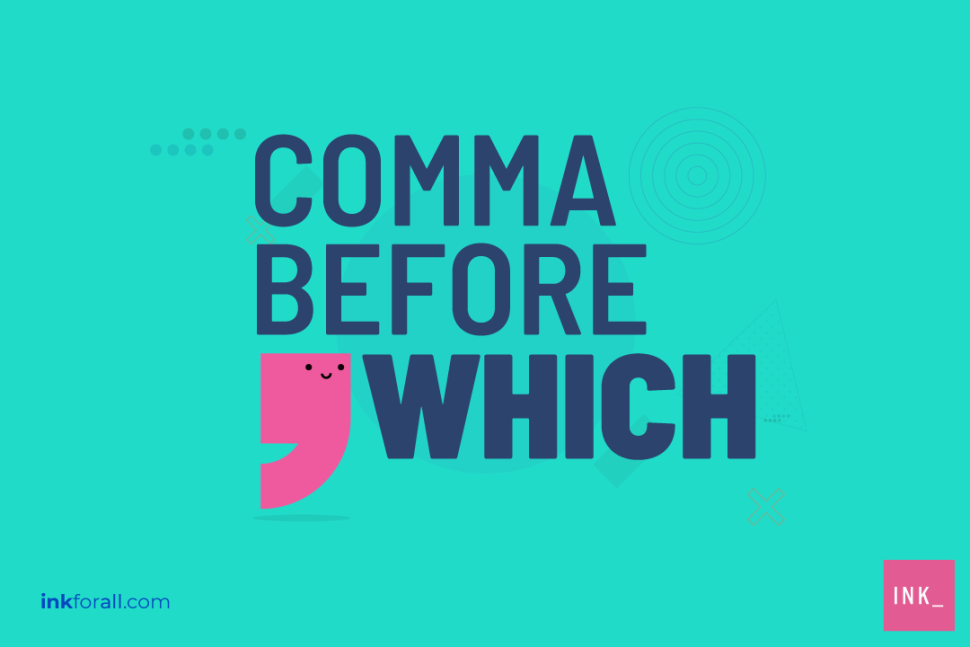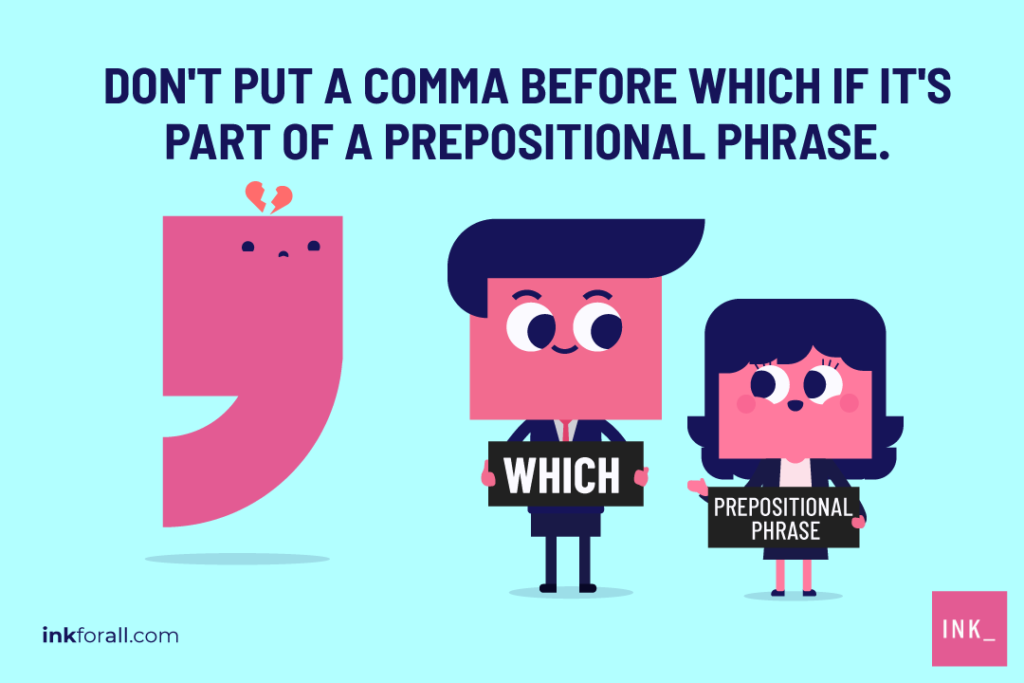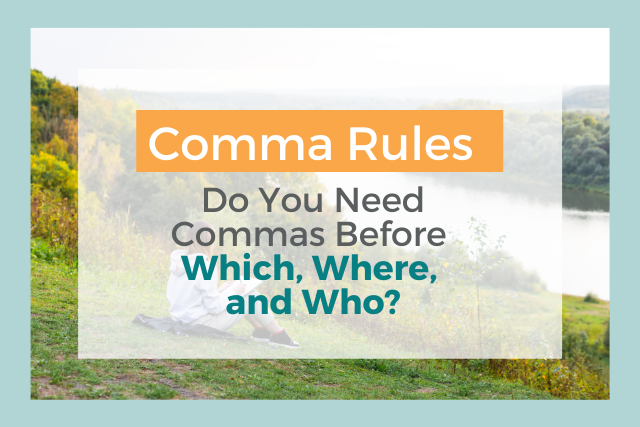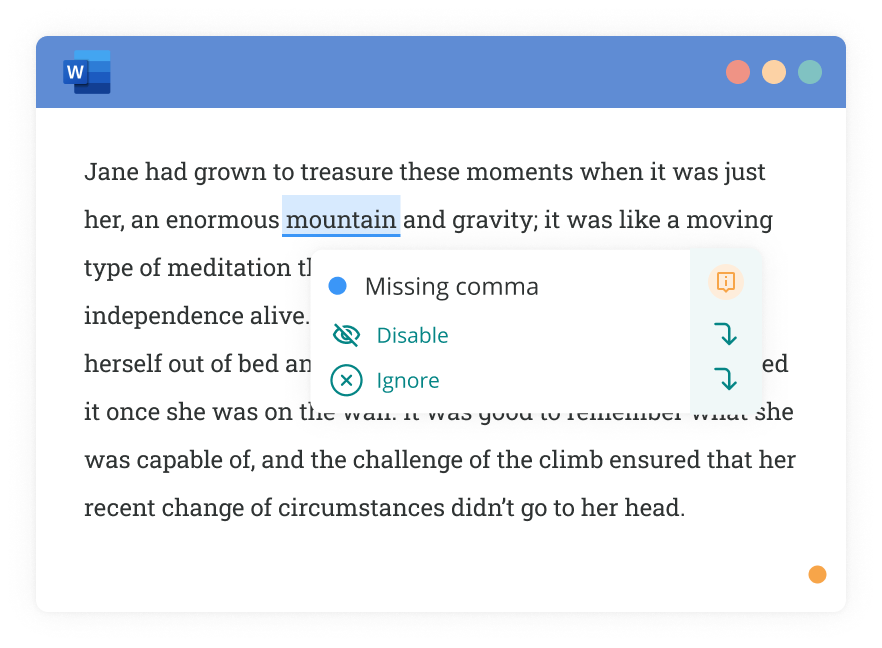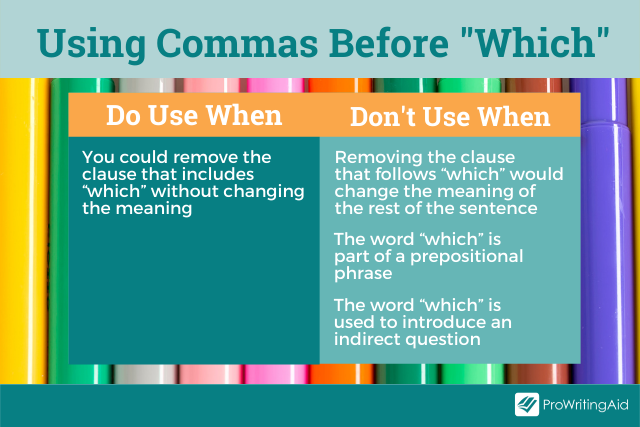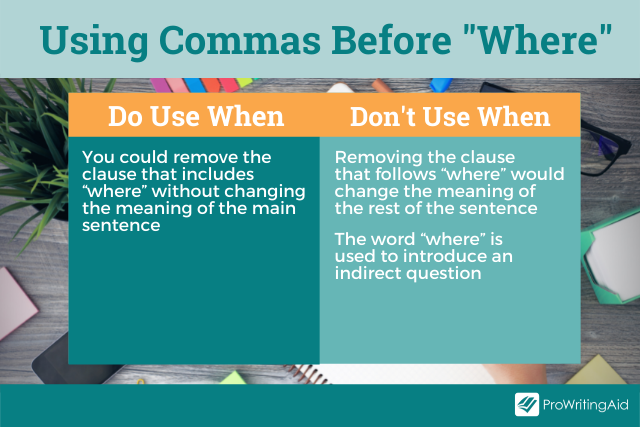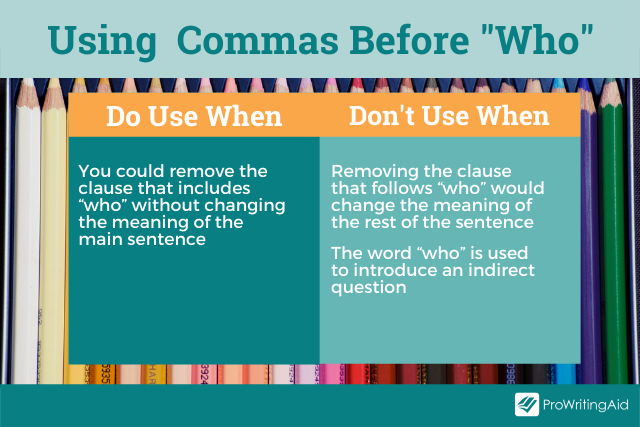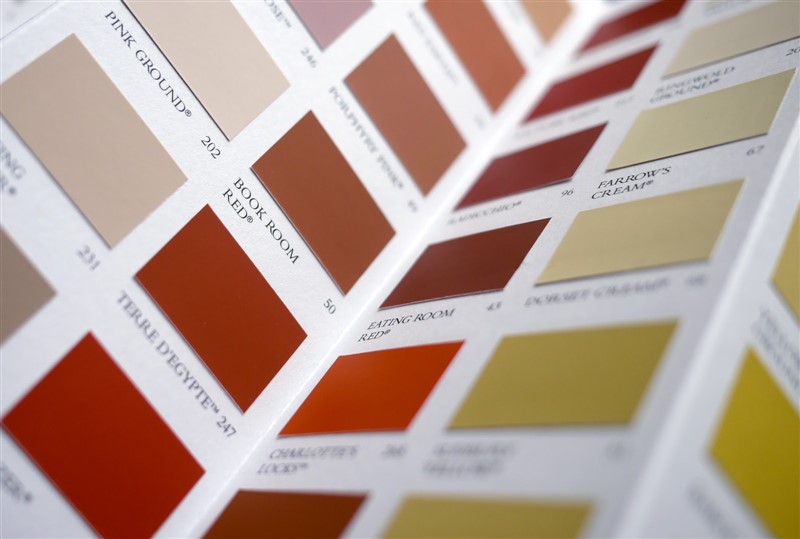Main Takeaways:
- Place a comma beforewhich when which precedes a nonrestrictive clause.
- A nonrestrictive clause is a phrase that adds non-essential information to a sentence without changing the overall meaning.
- Don’t place a commabeforewhich when which is part of a prepositional phrase.
- Don’t use a commabefore which when it’s used to pose an indirect question.
- We use which with nonrestrictive clauses, while we use that with restrictive clauses.
- When used with a restrictive clause, you don’t need to put a commabeforethat.
- Restrictive clauses function as identifiers. Removing a restrictive clause from a sentence changes the sentence’s meaning.
Whether to use a comma before or afterwhich in a sentence is a dilemma that many people face when writing. This grammar guide will teach you when you should and shouldn’t place a comma before which.
When it comes to grammatical conundrums, commas are often the culprit. Thankfully, learning when to use a comma before and afterwhich is actually pretty easy when you follow several simple rules.
When Should You Use a Comma Before Which?
Simply put, you should use a comma beforewhich when it precedes a nonrestrictive modifying clause. A nonrestrictive modifying clause is a phrase that adds nonessential information to a sentence without altering its meaning. It’s normally set off from the rest of a sentence with commas.
In this example, the phrase “which can be difficult to use correctly” is the nonrestrictive modifying clause. It modifies the noun comma, letting us know that commas can be challenging. Without it, however, the primary meaning of the sentence would remain intact.
In the example above, the sentence is correctly punctuated with a comma beforewhich. Another comma, placed after “correctly,” sets the phrase completely apart from the rest of the sentence. This is typical of nonrestrictive clauses.
Note: Nonrestrictive modifying clauses are also known as nonessential clauses or parenthetical expressions.
Should Which Always Be Preceded By a Comma?
The quick answer to this question is no. A comma should always precede which when it introduces a nonrestrictive clause. Otherwise, don’t place a comma prior to which.
There are several other ways that which can be used in a sentence. None of the following ways require a comma before which.
1. When Which Is Used in Prepositional Phrases.
Sometimes which forms part of a prepositional phrase. A prepositional phrase includes a preposition and a noun or pronoun that serves as the object of the preposition. It may also include adjectives that modify the object.
When which appears in prepositional phrases, it’s typically paired with a preposition.
- in which
- on which
- during which
- after which
- from which
When used this way, you don’t need a comma before the which.
2. When Which Forms a Question
Since sentences never begin with commas, it should go without saying that you don’t need one before which when it starts a sentence.
After all, it would look pretty strange if it was written as:
There is, however, another potential scenario when which forms a question. That’s the indirect question. In this scenario, a question is implied rather than asked outright. There is no question mark at the end of the sentence in indirect questions (unless they’re embedded in another question).
Essentially, both examples are asking about what items are on sale. One asks directly, while the other poses the question indirectly.
Comma After Which
Some grammarians believe that a comma can be used after which for reasons of style.
You’ll notice here that by adding a comma after the which, you end up with commas before and after it. This can lead to a choppy sentence. In this case, rephrasing may be the better option.
That vs. Which: Picking the Right Word
When learning how to punctuate a sentence using the word which, it’s important to understand when which isn’t the right word at all.
One Rule to Guide Them All
It’s easy to get tangled up choosing between that and which, but there’s a simple rule for picking the right word. That is used with restrictive clauses. Which is used with nonrestrictive clauses.
Restrictive Clauses
To simplify, restrictive clauses provide essential descriptive information about the noun they modify. They function as identifiers, essentially narrowing things down. They can’t be removed from a sentence without altering the meaning.
The restrictive clause in this sentence, “that are well-trained,” modifies the noun—in this case, dogs. This clause narrows it down to a specific category of dogs: well-trained dogs. You can’t remove the clause without altering the sentence’s essential meaning. That makes it a restrictive clause.
When used this way, there’s no need to place a comma before that.
Nonrestrictive Clauses
As discussed earlier, nonrestrictive clauses add non-essential information to a sentence. Unlike a restrictive clause, a nonrestrictive clause doesn’t alter the main meaning of the sentence.
The nonrestrictive clause, “which Amy got from a rescue,” adds interesting information and context to the noun, dog. However, you can remove the clause from the sentence without changing the meaning.
No Comma Drama
Punctuating sentences can be challenging, and even experienced writers and grammarians often struggle with proper placement of commas. Remembering simple rules of usage can take the drama out of comma placement, letting the meaning of your sentences come through loud and clear.
Quick Comma Before Which Grammar Quiz
Comma Before Which Question #1
A. Use a comma before «which» only when it precedes a nonrestrictive clause.
B. Always use a comma before «which.»
Correct!
Wrong!
The answer is B. You should use a comma before “which” when it precedes a nonrestrictive clause.
Comma Which Question #2
A. Basketball is a sport that I enjoy watching.
B. Basketball is a sport which I enjoy watching.
Correct!
Wrong!
The answer is A. «That» is used with restrictive clauses, while «which» is used with nonrestrictive clauses.
Comma Before Which Question #3
A. Restrictive clauses are essential to the sentence’s meaning.
B. Restrictive clauses add non-essential information to a sentence.
Correct!
Wrong!
The answer is A. Restrictive clauses can’t be removed from a sentence without altering the meaning.
Correct!
Wrong!
The answer is FALSE. When «which» appears in prepositional phrases, you don’t need a comma before the «which.»
Comma Before Which
Almost got it! Review the article and try again
Read More: How To Use Commas In Your Writing
1) Do not place a comma before «that»; 2) Do not place a comma before who or which if the information provided by the relative clause is essential; 3) Place a comma before who or which if the relative clause is not necessary to know who or what the speaker means.
When using the relative pronoun «who«, «which«, or «that» in a sentence:
- Do not place a comma before «that«:
The man that lives next door is tall.
The man, that lives next door, is tall.
-
Do not place a comma before «who» or «which» if the information provided by the relative clause is essential to understand which person or thing the writer is talking about.
The man who lives next door is tall.
The man, who lives next door, is tall.
We need the relative clause «who lives next door» to know exactly who is the man the writer is talking about. We do not use commas in a situation like this.
-
Place a comma before «who» or «which» only if the relative clause is not necessary to know who or what you are talking about. That is, the relative clause provides additional information about the person or thing, but this extra information is not essential to identify the subject.
My neighbor Peter, who lives next door, is very tall.
Even if you omit the clause «who lives next door», the reader knows who you are talking about (your neighbor Peter). The clause «who lives next door» just adds extra information.
When someone or something is sufficiently identified, the description that follows is considered nonessential and should be surrounded by commas.
Contents
- 1. Using Commas with Relative Pronouns
- 2. Using a Comma Before ‘Who’ or ‘Which’ Changes the Meaning of a Sentence
- 3. When to Use ‘That’, ‘Who’ and ‘Which’
- 4. More Examples
1. Using Commas with Relative Pronouns
Look at this example:
People who live in cities are more stressed.
«Who live in cities» is a relative clause (a part of the sentence that tell us what type of person or thing the speaker means). Relative clauses begin with relative pronouns, such as «who«, «which«, or «that«.
The children who read at home regularly make the most progress.
The clause «who read at home regularly» is essential to understand the meaning of the sentence. If we omit this clause, the sentence makes no sense.
The children make the most progress.
The sentence above is incorrect since we are trying to say that only some students, those who read at home regularly, make the most progress.
Another example:
My brother, who works as a dentist, is wealthy.
If we take out the relative clause («who works as a dentist»), the sentence is complete and makes sense. It also provides the most relevant information (My brother is wealthy.)
When using a comma before «who» or «which», include also the closing comma (the comma after «dentist» in the example above). Some writers forget to add this important comma. At the end of a sentence, a period replaces a comma.
2. Using a Comma Before ‘Who’ or ‘Which’ Changes the Meaning of a Sentence
Examine this example:
My sister, who is very tall, can speak English and French.
This sentence is correct because you are assuming that the reader knows who you are talking about (your sister).
However, if you have two sisters, the reader may need to know which sister you are speaking about. Remember, we should avoid commas if the information is essential to know who or what you are talking about:
My sister who is very tall can speak English and French.
Another example:
I’m planning to go to Spain which is very sunny next month.
In this sentence, the comma is not optional. The clause before the relative pronoun tells us where you are going (Spain). In this particular context, the relative clause «which is very sunny» just adds extra information about Spain.
I’m planning to go to Spain, which is very sunny, next month.
- We use «who» for people (sometimes for animals too).
She doesn’t like people who get angry easily.
I don’t like movies who have scenes of violence.
- We use «which» for things.
I only buy watches which are waterproof.
My uncle, which is an engineer, went to London last week.
- We use «that» for people or things.
The girl that came last week is smart.
The dish that you prepared yesterday was delicious.
- «That» is more common than «which«, but sometimes you need to use «which» (see next point).
Rebecca works for a company that makes drones.
I don’t like movies that have scenes of violence.
- If the sentence requires commas, you should use «which» for things and «who» for people (not «that»).
Madrid, which is the capital of Spain, was founded around the year 860 A.C.
Alex, who is very tall, is a good chess player.
- In many situations, you can omit the pronoun in a relative clause. You can learn more about how to omit correctly that, who, or which.
Remember, we don’t put a comma before that.
Paris, that is the most romantic city in the world, is a beautiful place to live.
Paris, which is the most romantic city in the world, is a beautiful place to live.
Another example:
Rebecca, that lives in New York, is very smart.
Rebecca, who lives in New York, is very smart.
4. More Examples
Examples with «who«:
- The waiter who served us was rude.
- What was the name of the person who came yesterday?
- The man who was carrying a suitcase was very polite.
- My friend Olivia, who lives next door, is an engineer.
- What was the name of the person who wanted to talk to you?
- The police caught the girl who stole the wallet.
- Marie Curie, who was the first woman to win a Nobel Prize, discovered the existence of the elements polonium and radium.
- The movie was about a boy who was raised in Paris.
- A firefighter is a person who fights fires and rescues people.
- Do you know who took those pictures?
Examples with «that«:
- The restaurant that was destroyed in the fire has now been rebuilt.
- The protester that was arrested has hired a new lawyer.
- What happened to the hamburger that was on the table?
- A paradox is a statement or proposition that is seemingly contradictory.
- Andorra is a microstate that borders France and Spain.
- Thailand is the only Asian country that was never colonized by a European country.
- The company that was fined for air pollution is now investing in renewable energy.
Examples with «which«:
- Artificial intelligence, which combines computer science and robust datasets, enables the execution of complex tasks.
- The new stadium, which can hold 20,000 people, has an oval shape.
- We often go to Chicago, which is not far away.
- Inflation, which is pretty high right now, is having an impact on US consumers.
- Yoga, which improves core strength and flexibility, is very popular in India.
The words which, where, and who are relative pronouns, which means they introduce a clause that modifies part of the main sentence.
Including a comma before a relative pronoun will change the meaning of the sentence.
It can be tricky to remember when you need to use a comma before a relative pronoun and when you don’t. So when should you use a comma after which, where, and who?
The short answer is that it depends on the importance of the information that is attached to the relative pronoun.
In general, if the information that follows the relative pronoun is essential to the sentence, you should not use a comma. But if the information is extra and the sentence can stand alone without it, you should use a comma.
This article will explain this rule in detail and give you examples of sentences that should and should not use a comma before which, where, and who.
We’re about to get into a lot of rules and while you can always bookmark this article for easy reference, we’re going to put you on to a cheat code: ProWritingAid’s Grammar Checker. You’ll never have another missing or misplaced comma with its powerful Realtime Checker.
Sign up for a free account and try it today.
Do You Put a Comma Before Which? When to Do It
You should use a comma before “which” if:
- You could remove the clause that includes “which” without changing the meaning of the main sentence
You don’t need to use a comma before “which” if:
- Removing the clause that follows “which” would change the meaning of the rest of the sentence
- The word “which” is part of a prepositional phrase like “in which,” “from which,” or “with which”
- The word “which” is used to introduce an indirect question
Examples of Using a Comma Before Which
- Example 1: “The peregrine falcon, which can dive at speeds of almost 200 miles an hour, is the fastest bird in the world.”
In this example, the main sentence is “The peregrine falcon is the fastest bird in the world,” and the information attached to the relative pronoun is “which can dive at speeds of almost 200 miles an hour.”
This sentence can stand alone without the clause that includes the relative pronoun, so we do use a comma before the word “which.”
- Example 2: “I have a few thousand dollars saved up right now, which should be enough to fund my summer abroad.”
Here, the main sentence is “I have a few thousand dollars saved up right now”, and the information attached to the relative pronoun is “which should be enough to fund my summer abroad.”
Again, this sentence can stand alone without that extra information, so we do use a comma before the word “which.”
- Example 3: “My dad’s old violin, which he got back in the 90s, is the most expensive instrument I’ve ever played.”
See if you can identify the main sentence in this final example. Can it stand alone without the information attached to the word “which”?
Examples of When NOT to Use a Comma Before Which
- Example 1: “This is the prison cell in which a famous monarch spent the last days before her execution.”
The word “which” is part of the prepositional phrase “in which.” You never need to use a comma before “which” if it’s part of a prepositional phrase.
- Example 2: “I don’t know which way to go.”
In this example, the word “which” introduces a question (the indirect form of “Which way should I go?”), so you shouldn’t use a comma before it.
- Example 3: “I asked my mom which dress I should wear to prom, and she said they all looked beautiful.”
Again, the word “which” introduces a question (the indirect form of “Which dress should I wear to prom?”), so you shouldn’t use a comma before it.
When to Use a Comma After Which
The only time you need to use a comma after “which” is when you’re including an aside or a parenthetical phrase between the word “which” and the information that comes after it.
For example, you might say: “This chapter will be included in our final exam, which, in case you weren’t paying attention, is taking place next Tuesday.” In this case, the phrase “in case you weren’t paying attention” is a parenthetical phrase, so you would use a comma to separate it from the rest of the sentence.
Should You Put a Comma Before Where?
You should use a comma before “where” if:
- You could remove the clause that includes “where” without changing the meaning of the main sentence
You don’t need to use a comma before “where” if:
- Removing the clause that follows “where” would change the meaning of the rest of the sentence
- The word “where” is used to introduce an indirect question
Examples of Using a Comma Before Where
- Example 1: “The city of Yakutsk, where temperatures average minus 50 °C, is considered the coldest city on Earth.”
The main sentence is “The city of Yakutsk is considered the coldest city on Earth,” and the information attached to the relative pronoun is “where temperatures average minus 50 °C.” This sentence can stand alone without the information that follows the relative pronoun, so we do use a comma before the word “where.”
- Example 2: “I’m headed to Boston, where my brother is waiting for me.”
Here, the main sentence is “I’m headed to Boston,” and the extra information is “where my brother is waiting for me.” Again, this sentence can stand alone without that extra information, so we do use a comma before the word “where.”
- Example 3: “I went to college in a wealthy part of Connecticut, where practically everyone spoke with a posh accent.”
See if you can identify the main sentence in this final example. Can it stand alone without the information attached to the word “where”?
Examples of When NOT to Use a Comma Before Where
- Example 1: “Seattle was the first city where I lived on my own after I graduated college.”
In this example, the phrase attached to the word “where” is “I lived on my own after I graduated college.” Without this phrase, the sentence is simply “Seattle was the first city.” This sentence means something different from what it was intended to mean. Therefore, you shouldn’t use a comma before the where, because you can’t split the two phrases apart.
- Example 2: “Do you know where I left my keys?”
In this case, the word “where” introduces a question (the indirect form of “Where did I leave my keys?”), so you don’t need a comma before it.
- Example 3: “I asked my mom where I can park my car tonight.”
Again, the word “where” introduces a question (the indirect form of “Where can I park my car tonight?”), so you don’t need a comma before it.
When to Use a Comma After Where
The only time you need to use a comma after “where” is when you’re including an aside or a parenthetical phrase between the word “where” and the information that comes after it.
For example, you might say: “We’re standing in front of Oxford University, where, for the movie buffs in the crowd, many of the scenes in the Harry Potter franchise were filmed.” In this case, the phrase “for the movie buffs in the crowd” is a parenthetical phrase, so you would use a comma to separate it from the rest of the sentence.
When to Use a Comma Before Who
You should use a comma before “who” if:
- You could remove the clause that includes “who” without changing the meaning of the main sentence
You don’t need to use a comma before “who” if:
- Removing the clause that follows “who” would change the meaning of the rest of the sentence
- The word “who” is used to introduce an indirect question
Examples of Using a Comma Before Who
- Example 1: “My colleague Jeremy, who you met at the Christmas party last year, just signed up for a membership at your gym.”
In this example, the main sentence is “My colleague Jeremy just signed up for a membership at your gym,” and the clause attached to the word “who” is “you met at the Christmas party last year.” Because the sentence can stand on its own without this extra information, we do use a comma before the word “who.”
- Example 2: “My landlord has a bulldog named Francis, who growls at me every time I enter the building.”
Here, the main sentence is “My landlord has a bulldog named Francis,” and the phrase attached to the word “who” is “who growls at me every time I enter the building.” Again, we need a comma because the sentence can stand alone without the extra clause.
- Example 3: “Barack Obama, who was born in Honolulu, became the first African-American president of the United States in 2009.”
See if you can identify the main sentence. Can it stand alone without the information attached to the word “who”?
Examples of When NOT to Use a Comma Before Who
- Example 1: “All I want is to date a man who loves reading books just as much as I do.”
In this example, the phrase attached to the word “who” is “who loves reading books just as much as I do.” Without this phrase, the sentence is “All I want is to date a man.” This sentence means something different from what it was intended to mean. Therefore, you shouldn’t use a comma before “who,” because you can’t split the two phrases apart.
- Example 2: “I hate having to work with people who don’t pull their own weight on the team.”
Here, the phrase attached to the word “who” is “who don’t pull their own weight on the team.” Without this phrase, the sentence is “I hate having to work with people.” This sentence means something different from what it was intended to mean. Again, we need a comma before the word “who.”
- Example 3: “I asked my mom who I should invite to my birthday party.”
In this case, the word “who” introduces a question (the indirect form of “Who should I invite to my birthday party?”), so you don’t need a comma before it.
When to Use a Comma After Who
The only time you need to use a comma after “who” is when you’re including an aside or a parenthetical phrase between the word “who” and the information that comes after it.
For example, you might say: “This is my Grandma Nancy, who, if I do say so myself, makes the best chocolate chip cookies in the country.” In this case, the phrase “if I do say so myself” is a parenthetical phrase, so you would use a comma to separate it from the rest of the sentence.
Conclusion on Using a Comma Before Which, Where, and Who
There you have it: a comprehensive guide for when to use a comma before the words which, where, and who.
Was this article helpful? Let us know in the comments.
Take your writing to the next level:
20 Editing Tips from Professional Writers
Whether you are writing a novel, essay, article, or email, good writing is an essential part of communicating your ideas.
This guide contains the 20 most important writing tips and techniques from a wide range of professional writers.

Are You Asking a Question?
When you use the word “which” as part of a question, the word could be considered an interrogative pronoun. You’re asking someone to specify one or more items from a definite set.
Examples:
- Which flavor is your favorite?
- Which is your favorite?
When you use “which” to ask a simple question, you don’t need a comma.
You also don’t need a comma before “which” when it’s used as part of an indirect question. An indirect question has been rewritten in a declarative style that doesn’t require a question mark.
I wondered which is your favorite.
In the case of an indirect question, as in the example above, no comma should be used. On the other hand, when a direct question appears within a longer sentence, it should always be set off by a comma.
Could you tell me, which is your favorite?
In the example above, the direct question must be set off from the rest of the sentence.
You also need a comma before an interrogative “which” when the word appears in dialogue. That has more to do with the formatting of dialogue than with the word “which”. Even if you replace “which” with another word, you would still need the same formatting for any piece of dialogue.
She asked, “Which is your favorite?”
He answered, “I don’t know.”
Using “Which” in a Prepositional Phrase
“Which” is frequently used as the object of a prepositional phrase. Keep an eye out for sentences that have a preposition before the word “which,” since that construction indicates that you do not need to use a comma. Common prepositions include: above, across, against, along, among, around, at, before, behind, below, beneath, beside, between, by, down, from, in, into, near, of, off, on, to, toward, under, upon, with, and within.
- That was the park at which he lost the game.
- I saw a play in which the main character spoke Japanese.
- That is a subject of which I am ignorant.
- The country to which I moved was across the international dateline.
- The high school from which I graduated was highly ranked.
When you use “which” after a preposition, you won’t need an additional punctuation mark.
Using “Which” in a Nonrestrictive Clause
Often, the word “which” appears as part of a clause that isn’t essential to the meaning of the sentence. For instance, the word might appear as part of a parenthetical, explanatory phrase. Parenthetical phrases can easily be removed from the sentence without changing the meaning. They should be identified with a pair of commas.
Figure skating, which I started at age five, has always been my favorite sport.
You could easily remove the nonrestrictive clause from the sentence without changing the meaning.
Figure skating has always been my favorite sport.
You may also come across the word “which” used in a non-defining relative clause. In this context, “which” introduces a phrase that gives extra information about a person or thing.
He studied French, which was a subject that he enjoyed.
In the sentence above, the relative clause explains more about the word “French,” but it’s not essential information. Non-essential, nonrestrictive clauses should be set off from the rest of the sentence with a set of commas. If the non-essential clause appears at the end of the sentence, you would only need one comma to set it apart from the rest of the sentence.
Using “Which” in a Restrictive Clause
In other cases, a relative clause may be essential. In those circumstances, we call it a defining relative clause. Often, you can identify a defining relative clause by asking yourself by asking yourself, would I be able to replace “which” with “that”?
The topic which I enjoy the most is art history.
The topic that I enjoy the most is art history.
Also, ask yourself whether the phrase is essential. When you remove the phrase “which I enjoy the most,” do you change the meaning of the sentence?
The topic is art history.
In this case, the meaning changes when you remove the relative phrase. For both of those reasons, we know that “which I enjoy the most” functions as a restrictive phrase in this case, and it therefore does not require commas.
The example above uses “which” to introduce a defining relative clause. The phrase provides additional information that is essential to the sentence. Interestingly, in American English, people usually prefer the word “that” to “which” in a defining clause or any other restrictive clause. So, when in doubt, you may want to replace “which” with “that” and sidestep the question of whether or not to place commas entirely. Similarly, you could omit the relative pronoun when it’s used in this context.
The topic I enjoy the most is art history.
By making these two modifications—either replacing “which” with “that” or omitting the word “which”—you can avoid questions of comma usage.
Do You Need Commas?
Look at the following sentences and try to determine whether you should use commas. You can find the answer key with proper punctuation below the quiz.
Quiz
- Which toy is bouncier?
- She asked which laundry soap we use.
- He asked “Which lamp do you like best?”
- They prefer the style guide which he advocated.
- He introduced a comma splice which is a common grammatical error.
- The Oxford comma which is named after Oxford University Press has long been the subject of arguments.
- They want to know which dependent clause should be deleted?
- She wanted to buy the ship which won the race.
- An apostrophe which identifies the possessive case should be used here.
- Independent clauses which are joined with a semicolon do not need a coordinating conjunction.
Answers
The answers in bold did not need any modifications.
- Which toy is bouncier?
- She asked which laundry soap we use.
- He asked, “Which lamp do you like best?”
- They prefer the style guide which he advocated. Alternative: They prefer the style guide he advocated.
- He introduced a comma splice, which is a common grammatical error.
- The Oxford comma, which is named after Oxford University Press, has long been the subject of arguments.
- They want to know, which dependent clause should be deleted?
- She wanted to buy the ship which won the race. Alternative: She wanted to buy the ship that won the race.
- An apostrophe, which identifies the possessive case, should be used here.
- Independent clauses which are joined with a semicolon do not need a coordinating conjunction. Alternative: Independent clauses that are joined with a semicolon do not need a coordinating conjunction.
Sources:
- https://dictionary.cambridge.org/us/grammar/british-grammar/relative-clauses-defining-and-non-defining
- http://www.cws.illinois.edu/workshop/writers/restrictiveclauses/
- https://www.dictionary.com/e/that-vs-which/
- https://owl.purdue.edu/owl/general_writing/punctuation/commas/extended_rules_for_commas.html
- https://grammar.collinsdictionary.com/us/easy-learning/interrogative-pronouns
Writing and speaking in American English often includes the relative pronouns which and that. We use these words to provide essential and nonessential (also known as restrictive and nonrestrictive) information that further explains or identifies.
The distinction between which and that was once more established within daily formal writing. The word which was used for nonessential clauses, and the word that was used for essential clauses.
Examples
Here is the stapler, which will be yours until further notice.
Here is the stapler that will be yours until further notice.
In the first sentence, which leads a nonessential clause with information that is clarifying but not vital. Removing the clause would not alter what needs to be communicated. We could write only here is the stapler and our main message would still be intact.
In the second sentence, that leads an essential clause identifying one stapler as distinct from others. The clause thereby “restricts” information, and removing it would alter what needs to be communicated. The recipient would not be aware that the stapler is a specific one that could be taken back later.
Within that once more-fixed usage, punctuation was equally set. A nonrestrictive which clause included a comma or commas; a restrictive that clause did not. However, over time which has gained increasing acceptance as both a restrictive and nonrestrictive pronoun in American English, particularly in informal and mass communication.
Examples
Here is the stapler, which will be yours until further notice.
Here is the stapler which will be yours until further notice.
Here we have which functioning as both an essential and a nonessential marker. This shifts our instrument for understanding the context from the pronoun to the punctuation.
If which is preceded by a comma, it is nonrestrictive. If it is not preceded by a comma, it is restrictive. For those not yet familiar with these precepts, the dual application of which can create hurdles to meaning.
The following guidelines will help you maintain clarity in your writing by knowing when to use a nonrestrictive which clause with an identifying comma before it.
Comma Before Which: Nonrestrictive Clauses
Although popular style may use which both restrictively and nonrestrictively, we as precise writers will aim to maintain the distinction by applying which as a nonrestrictive relative pronoun.
Use one comma before which when the nonessential clause ends a sentence:
Jermaine has the toolbox, which is mine.
When the nonessential clause appears in the midst of a sentence, use a comma before and after the which clause.
Jermaine has the toolbox, which is mine, and he will return it later today.
Comma Before Which: Prepositional Phrases
The word which is often paired with prepositions. Just a few examples include:
| above which | by which | of which |
| at which | from which | to which |
| below which | in which | upon which |
| beside which | near which | with which |
We would not use a comma before or after which when it is part of a prepositional phrase.
Correct: That is the location at which we’ll arrive by 7 p.m.
Incorrect: That is the location at, which we’ll arrive by 7 p.m.Correct: To which address should he send this?
Incorrect: To, which address should he send this?Correct: That is the basis upon which the jury will judge the outcome.
Incorrect: That is the basis upon, which the jury will judge the outcome.
Incorrect: That is the basis upon which, the jury will judge the outcome.
Comma Before Which: Indirect Questions
The word which commonly opens a direct question (also referred to as an interrogative sentence):
Which way is the bank?
Which dress are you wearing to the dance?
Which bat will Babe use during the game?
The same questions might also be indirect ones presented as declarative statements. We would not use a comma before which when it is part of an indirect question.
Examples
I asked him which way the bank is.
Brynne wants to know which dress you are wearing to the dance.
The fans are curious which bat Babe will use during the game.
When the question beginning with which is part of dialogue with preceding attribution, we would include a comma before it:
I asked, “Which way is the bank?”
Related Topics
That vs. Which
Restrictive Clause: What Is a Restrictive Clause?
Nonrestrictive Clause: What Is a Nonrestrictive Clause?
Pop Quiz
Insert commas wherever they belong with the word which in the following sentences. If a use of which does not require a comma or commas, leave it be.
1. Jessica asked Marlon about the heirloom which has been in his family for centuries.
2. The answer to the question which we’ll have tomorrow may surprise all of us.
3. Fatmir asked “Which fact will sway Maribella?”
4. On which day will they hold the auction?
5. Which stain on the rug are you talking about?
Pop Quiz Answers
1. Jessica asked Marlon about the heirloom, which has been in his family for centuries.
2. The answer to the question, which we’ll have tomorrow, may surprise all of us.
3. Fatmir asked, “Which fact will sway Maribella?”
4. On which day will they hold the auction? No commas
5. Which stain on the rug are you talking about? No commas
Advertisement
If the article or the existing discussions do not address a thought or question you have on the subject, please use the «Comment» box at the bottom of this page.

